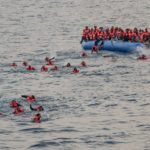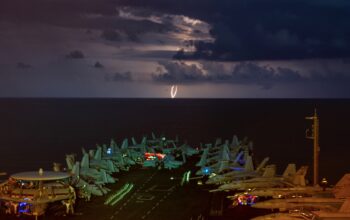On September 18, 2005, Angela Merkel (CDU: Christian Democratic Union) was elected German chancellor for the first time. Now, twelve years later, the German people have declared their trust in her once more despite controversial debates as for example over Merkel’s handling of the refugee crisis which splits the country, and despite critical voices within and outside the CDU calling for change.
But how can we explain Angela Merkel’s success? Is it popularity that keeps Merkel in power? Is it a sheer lack of acceptable alternatives? Or are there subtler underlying reasons that motivated so many to vote for her? And if so, where will we be able to find those reasons?
World Politics
If we look at current world politics we might be able to find reasons for Angela Merkel’s re-election there. Next to leaders such as Vladimir Putin, Donald Trump and Recep Tayyip Erdogan, the German chancellor embodies a vision of stability, moderate policies and security. In the past, she has proved herself a manager of crises: be it the Euro crisis, holding up the dialogue with Russia, or her response to the refugee crisis (even though it has split the party and the people). These crises have strengthened Merkel’s position and her voters seem to believe that she is able to handle the present crises and those that will surely come in the near future. She offers equilibrium at a time of uncertainty.
With Brexit, an increased risk of terrorism and the conflict between the United States and North Korea, we live in times of instability and insecurity. Therefore many people prefer not to take any risks or to make ‘experiments’ on the national level by voting for change in government. They rather stick to what (or whom) they already know and consider to be at least acceptable.
Merkel and Schulz
The line between the CDU and the SPD (Social Democrats) is blurred. And the SPD having been the Christian Democrats’ junior partner during the last legislative period did not help either. Because SPD has been a part of the coalition government with CDU and directly involved in active decision-making processes for the last four years, they have difficulties criticising the CDU without criticising themselves. Therefore, it seems that the Social Democrats are not different enough from the Christian Democrats. Martin Schulz, who had been the President of the European Parliament for five years (2012-2017) and then became the SPD’s chancellor candidate in this year’s election, does not seem to differ much from Angela Merkel. Thus the election campaign does not polarise the people, and so the people keep voting for the CDU.
Refugees and security have been important topics during the election campaign, especially in the media and there is very little distinction in the Social Democrats’ and the Christian Democrats’ policy regarding those issues: both warn of a repetition of the 2015 refugee crisis, both want to strengthen the police force and plan of having more surveillance cameras in public places.
But not only have the two parties moved closer together politically, already during the 2013 election campaign the CDU had left the SPD standing without one of their goals – the minimum wage – by taking on the topic themselves. This year then Merkel managed to escape the pressure the CDU had been put under by the SPD and the opposition through making a vote on same-sex marriage possible in parliament before the election.
Coalition and Consensus
Angela Merkel’s strategy of using other parties’ political agenda to gain the support of the people is perhaps her greatest asset against the other parties.
And it was not only the minimum wage and same-sex marriage. When, after the catastrophe of Fukushima, she made a U-turn in the party’s energy policy by turning away from nuclear energy and promoting renewable energies, the chancellor left the Green Party without a cause and we saw them plummet in the polls.
Merkel appears to take the majority as her guideline. She lets other politicians lead the debates and then steps in when an opinion has formed among the people and there already is a rough consensus. She absorbs different positions in order to embody this consensus, and thus makes opposition highly difficult and forms a coalition – which is inevitable – with almost every other party possible.
In addition, she promises nothing that she cannot keep, or as the German news satire show “Heute show” put it: “We promise nothing. But that we keep.” Merkel does not offer a vision of the future but her voters know that the future is far too unpredictable to predict, anyway.
Angela Merkel and the CDU After the Elections
Now, after the election, the development of German politics and Merkel’s career as chancellor will certainly be interesting. Shortly after the results of the election had come in the SPD declared that they would be part of the opposition for the next four years which could have three possible results. Should the CDU/CSU not be able to form a coalition with another party there might be new elections which would likely lead to the Christian Democrats losing more votes and parties such as Die Linke (“The Left”), but also the right-wing Alternative für Deutschland (AfD, “Alternative for Germany”) gaining votes. Yet, this outcome is very unlikely. The other option would be a minority government. This, too, would be far from profiting Angela Merkel and the CDU since they would have to govern without a majority of seats in parliament.
The most likely outcome is a coalition of CDU/CSU, FDP (Free Democrats) and the Green Party. While this would provide a working government, it would still not be easy since the parties’ policies concerning certain issue areas such as pension and environment differ from one another in various points, even within the CDU and CSU (the CDU’s Bavarian sister party).
Never Ending Story?
But whatever the outcome of the coalition negotiations will be, fact is that Angela Merkel has been elected for the fourth time in a row. It is likely to be due partly to her adopting other parties’ aims and leaving them without that part of their agenda that sets them apart from the CDU.
Another cause is, to a certain extent, a great part of the German people feeling that security, stability, continuity and a certain degree of predictability are needed at the moment. Especially in comparison with other powerful leaders such as Trump, Putin and Erdogan, Merkel seems to embody those values and appears to many as the best candidate to manage our crises – present or future.
But as the German psychologist Stephan Grünewald pointed out: the standstill agreement of “I make sure that you’ll be fine, but please no questions” won’t work forever. And the seemingly never ending story of Chancellor Merkel might come to an end as abrupt as the era of Kohl who had been chancellor for 16 years until the general election in 1998.
Now, she has four years time to prove Grünewald wrong, to be the competent crisis manager the people describe her as, and to maintain “a Germany in which we live well”.
By Merle Emrich
Photo Credit:
Angela Merkel, James Rea, CC BY-NC-ND 2.0










